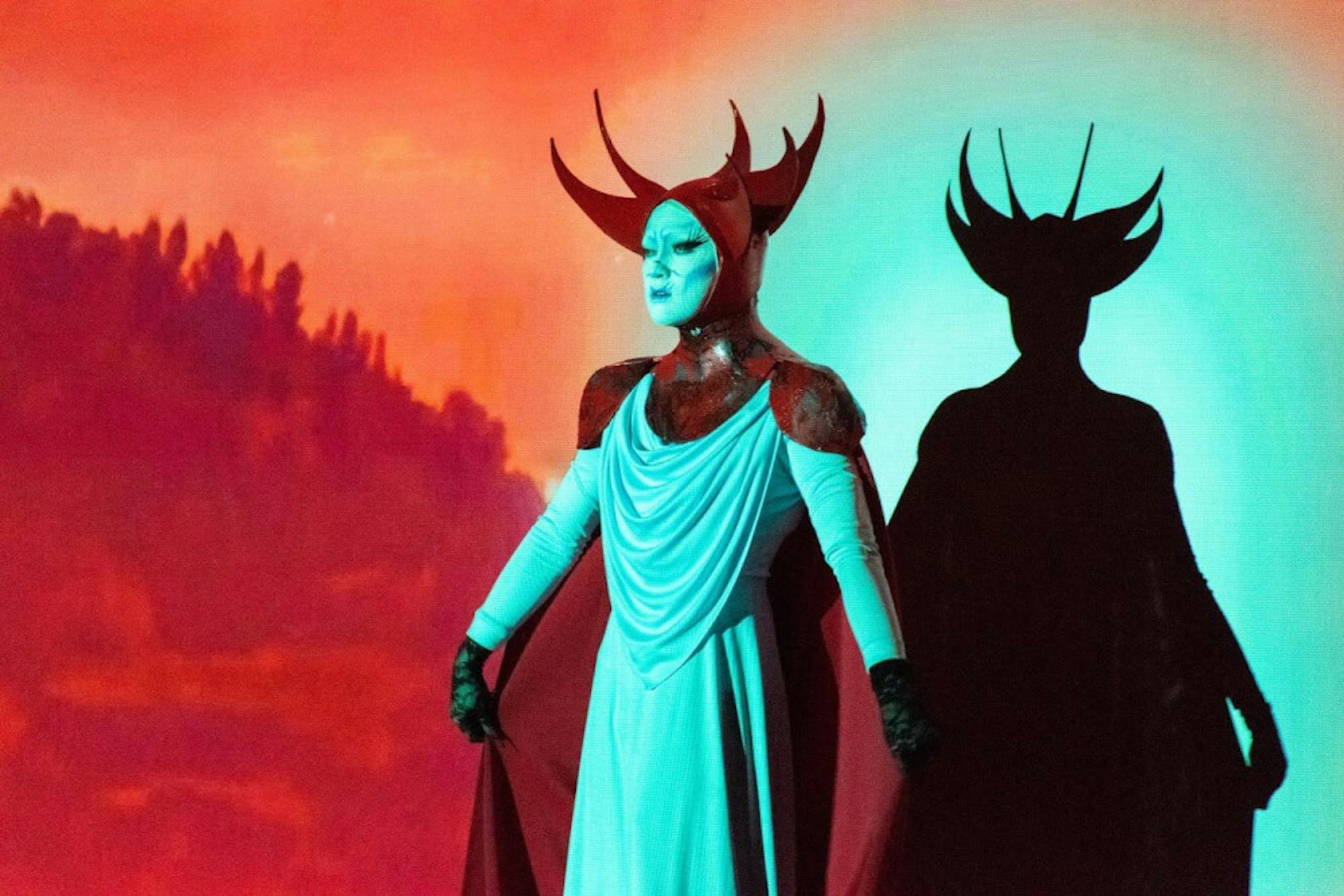Last Saturday night, as the moon approached its midnight zenith, an ashen-faced apparition with jagged horns crept onto the stage at Brookline’s Coolidge Corner Theatre. As the screen behind this figure sprouted shadowy giants and generated psychedelic images of germinating flora, the audience, barely audible over the percussive boom of the speakers, overcame its bewilderment and found its voice.
The audience's response to this frightful scene, however, sounded much closer to exhilarated whoops than to bloody murder. Because this horror show — Haus of Oni’s monthly horror drag show at Coolidge After Midnite — was exactly what they paid for. Led by Akira Oni, the Haus of Oni’s Saturday show at the Coolidge featured Boston-based queens Binx and Bruiser and newly-minted Providence, R.I., queen Sheik. Saturday’s performance, which preceded a screening of 1996 cult horror classic “The Craft” in commemoration of Women in Horror Month, was the fourth in a series that began in November.
A self-described “infectious psychic entity,” Oni’s singular artistic perspective led them to the Coolidge in search of a platform free of the traditional drag scene’s technical constraints. Few venues in the area have a projection screen large enough for the intricate narrative backdrop that has become one of the Haus of Oni’s hallmarks.
“My partner … makes all the visuals that go to our performances,” Oni said. “We’re both very into horror movies and hand-drawn animation and Japanese animation, and I’d say the visual we try to go for is more like … acid demon.”
The striking visuals and meticulous detail characteristic of Oni’s drag belie the fact that they have no formal training in any visual arts.
“Up until I started drag … I was always bad at drawing and all of the stereotypical art forms,” they revealed. “But I was a performer my entire life; I was a theatre kid and I was in a lot of choral programs.”
In the four years Oni has been doing drag, they and their partner have picked up a multidisciplinary crash course in drawing, makeup and costume construction. For Oni’s trademark armor, they found practical inspiration in the world of cosplay.
“With the headpieces, we’ve both started learning the medium of 3D sculpture together while I was in drag,” Oni explained. “We make all the armor out of EVA foam, which is traditionally used by cosplayers.”
A lifelong horror geek, Oni’s drag persona emerged naturally, marrying a love of performance with that classic drag proclivity toward shock and awe. Their heritage and associated pop cultural influences also play a key role in shaping Akira Oni.
“I’ve always loved horror movies … I used to watch them with my mom all the time,” Oni said. “My mom is Hawaiian and Chinese and Japanese, so a lot of the cultural inspiration that I pull is from that side of myself … and I’ve always been very influenced by anime and animation in general — I’m trying super hard to be a cartoon character!”
Working within the Coolidge After Midnite programming has afforded Oni an unusual level of artistic autonomy. Oni not only designs the program’s pre-screening drag shows but also selects the movies that screen following the Haus of Oni’s productions. The ability to design a continuous narrative experience for the audience has allowed Oni to explore their creative ideas in greater depth.
“I’m heavily inspired by ritual … I try to envision all my performances as spells or witchcraft on stage,” they said. “With [the 2018 version of] 'Suspiria’ (1977), the choreographer Damien Jalet is very into ritual experimental dance … so I tried to model my performance after the kind of lines he uses in his dance.”
That seductive limbo between religion and occult and divinity and sorcery has become Oni’s foremost artistic fascination. Oni sees their drag drawing its transformative power from stepping into that uncertain space and from the potent, turbulent energy of horror.
“The things I’m very interested in are darker,” they said. “It comes from ritualism — art is the closest thing I can get to magic.”
Akira Oni's horror drag invades Coolidge Corner Theatre

A performance of Haus of Oni's horror drag show is pictured at the Coolidge Corner Theatre in Brookline, Mass.





